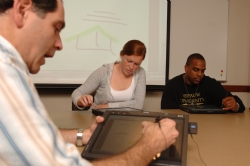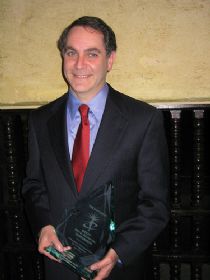Professor Dave Berque
October 5, 2009
Dave Berque, professor and chair of computer science and Tenzer Family University Professor in Instructional Technology, has quite a few feathers in his mortarboard. He was named 1997 U.S. Baccalaureate Professor of the Year by the Carnegie Foundation for the Advancement of Teaching and received a 2007 Mira Award for Education Contribution in Technology. He has received more than $1 million in external grant funding, much of it used to support research that involved DePauw students. He also holds three patents—two computer science-related and one for a clamp used for stringing tennis racquets—and has performed stand up at a comedy club.
It's possible that many of those things wouldn't have happened had it not been for a fire.
 "When I was a graduate student, I was teaching a course with more than 100 students," Berque recalls. "The course dealt with very technical content that I would write on the blackboards at the front of the room. Most of the time, everyone would be so busy taking notes that they couldn't pay attention to what was going on. One day, four or five weeks into the class, there were seven students who had their hands in the air at the same time. I was excited that they wanted to ask something. But when I called on one of them, he pointed up at the ceiling and said, ‘I don't have a question. I just want to let you know that the lights are on fire.' There were literally flames coming out of the light fixtures. Later, I realized that I was in a room with more than 100 people, that the room was on fire and only seven people noticed it. And I wasn't one of them. I was so busy copying technical content onto that board, and they were so busy copying it into their notebooks that we weren't even aware of the environment, let alone thinking about the material we were studying. That got me thinking about how technology could be used to enhance the classroom dynamic."
"When I was a graduate student, I was teaching a course with more than 100 students," Berque recalls. "The course dealt with very technical content that I would write on the blackboards at the front of the room. Most of the time, everyone would be so busy taking notes that they couldn't pay attention to what was going on. One day, four or five weeks into the class, there were seven students who had their hands in the air at the same time. I was excited that they wanted to ask something. But when I called on one of them, he pointed up at the ceiling and said, ‘I don't have a question. I just want to let you know that the lights are on fire.' There were literally flames coming out of the light fixtures. Later, I realized that I was in a room with more than 100 people, that the room was on fire and only seven people noticed it. And I wasn't one of them. I was so busy copying technical content onto that board, and they were so busy copying it into their notebooks that we weren't even aware of the environment, let alone thinking about the material we were studying. That got me thinking about how technology could be used to enhance the classroom dynamic."
Hired by DePauw in 1992, Berque started work on DEBBIE (DePauw Electronic BlackBoard for Interactive Education), an electronic, collaborative notetaking and classroom interaction system that would replace paper in the classroom. The system allowed teachers to share notes electronically with every student in the class, eliminating the note-taking tedium that distracted Berque's students from engaging with the course material. "The vision was always that every student would have a computer during class someday," Berque says. Without an established hardware platform—in 1992, computers weren't standard in every classroom, let alone pen-based computers for each student—the approach went through multiple prototypes, including one that used light pens that could be used to write on standard LCD displays. Over time, more and more interactive features were added to the software—features that enabled students and faculty members to engage each other in multiple ways during class.
"One of the things that has been really good about working at DePauw is that if I wanted to try something that was experimental, I could," Berque says. "People have been willing to let me use facilities to try new things, and colleagues have tested experimental ideas in their own classrooms. A lot of those experiments have paid off. And when the ideas did not work, I always got plenty of constructive criticism."
About 10 years ago, it became clear that Tablet PCs (pen-based laptops) would become an affordable classroom computing platform, and, through several grants from Hewlett-Packard, Berque's work eventually began to take advantage of the pen-sensitive laptops.
 In 2003 Indianapolis-based DyKnow was founded to enhance, extend and commercialize the prototypes that had been developed at DePauw. The result was DyKnow Vision, a software package that is now used in classrooms at DePauw and around the world. Berque serves as a consultant to DyKnow helping with pedagogical and software design issues that arise, and several DePauw graduates work at the company, including founder and CEO David B. Becker '75.
In 2003 Indianapolis-based DyKnow was founded to enhance, extend and commercialize the prototypes that had been developed at DePauw. The result was DyKnow Vision, a software package that is now used in classrooms at DePauw and around the world. Berque serves as a consultant to DyKnow helping with pedagogical and software design issues that arise, and several DePauw graduates work at the company, including founder and CEO David B. Becker '75.
Berque first became interested in computer science as a pre-med student. "I was told that computers were becoming more important in medicine, so I took a class because I didn't have a background with them. I just loved the computer science course, and I had to drag myself away from it to do my other work. At some point I thought, why should I drag myself away from something I enjoy and I'm good at? Why not just study what I like? So, I decided to major in computer science instead of pursuing pre-medical requirements."
"The college that I attended had a saying: If you came to the school knowing what you wanted to major in and hadn't at least seriously questioned it before you left, then the school wasn't doing its job," Berque says. "It was OK to question your major and come back to it, but it was part of the liberal arts experience to explore."
That notion shaped Berque as a student and again as a professor known for integrating other disciplines into his courses. He and Professor of Psychology Terri L. Bonebright, with whom he collaborates on his educational technology research, developed a first-year seminar together called The Science of Design, which examines the design of everything from doorknobs to software interfaces. ("In a perfect world, I would really love to go back to school to study psychology," Berque says.) Another of Berque's courses on human-computer interaction—his area of specialty—fuses computer science, psychology and several other disciplines.
"Computer science is a great field for people who are interested in the liberal arts because most of the time you're connecting the discipline to something else," Berque says. "I definitely encourage students to explore around the boundaries."
Just as Berque has encouraged his students to survey other disciplines, the computer science department has made sure that the major is open to all students, regardless of their initial level of experience.
"There are some schools where you can only be successful in the major if you've already started down that path before coming to college," Berque says. "We're very careful to have an introductory course here that's open to all students. Computer science isn't about playing computer games or using Internet technology—it's about problem solving and critical thinking in the context of developing solutions to a wide range of fascinating problems. Anyone can begin the study of this at DePauw because their previous technology background really is not an issue."
An approach to education that is based on problem solving and critical thinking, Berque believes, is what prepares students for success in any field.
"The one thing we can be pretty sure about the world is that it will continue to change," he says. "There's no way a student is going to leave college having the exact information they need to be equipped for the rest of their lives. The only way students can be prepared for the future is to learn how to continually grow and how to critically analyze the new things they come across, so they can solve problems that have not even been formulated yet."
Back